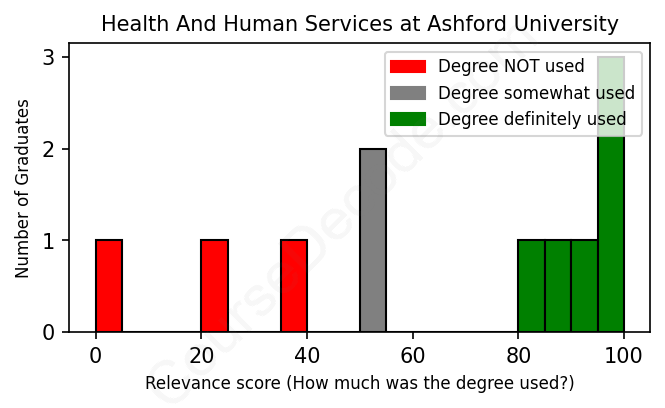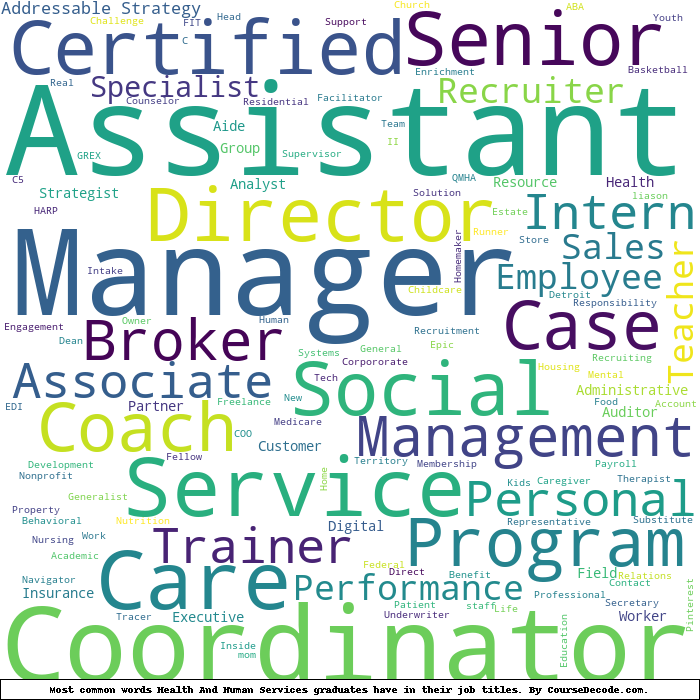
First, some facts. Of the Health And Human Services graduates from Ashford University we've analyzed , here's how many have used (or NOT used) their degree in their career:

These are estimates based on AI analysis of 11 LinkedIn profiles (see below).
The verdict? Slightly below average. Overall, with an average relevance score of 65%, Health And Human Services graduates from Ashford University have a slightly lower likelihood (-2%) of finding work in this field compared to the average graduate across all fields:
And for comparison, here's the chart for all profiles we've looked at across all degrees.
Also, after graduating, only 27% of these graduates have pursued further education other than another Bachelor's degree (such as a Masters degree or other), compared to the average across all profiles of 35%. This suggests a Bachelors degree is enough for most Health And Human Services graduates, and it's normal to look for work straight after graduation.
See the details:
|
Relevance score: 0% We think this person has NOT gone into a career related to their degree. We think this person has NOT gone into a career related to their degree.
DEGREE INFOGraduated in 2014 from Ashford University with a Bachelor of Arts - BA in Health And Human Services. No other secondary education since. JOB HISTORY SINCE GRADUATIONFood Runner Favor Delivery Sep 2018 - Present ABOUTI have a minimum of 20 years working with the elderly in assisted living, Residential Care for the Eldery facilities, home and hospice care. I have many years experience in medication management and distribution. I have been a supervisor and administrator in the facilities i have worked in. I also have 6 years experience as a Program Coordinator for a community based program for developmentally disabled adults and seniors. I can type 45 plus words or minute and am computer literate. |
The top 10 most common jobs done by the graduates we've analyzed (ranked most common to least) are:
When looking at the types of jobs people have landed after graduating with a degree in Health and Human Services from Ashford University, it seems like there's a mixed bag. Many graduates have taken roles that are somewhat relevant, like Social Workers or Certified Nursing Assistants, which directly apply the skills and knowledge they gained during their studies. These positions are closely tied to health and human services, as they involve caring for individuals and supporting their health needs. Other roles, like a Teacher or a Medicare Customer Service representative, also connect to the field to some extent, using relevant people skills or knowledge of health systems.
However, it's not all healthcare-focused jobs. A noticeable chunk of graduates ended up in positions that don't really utilize their specific training in health and human services, like Assistant Store Managers or Property Managers. These roles lean more towards general management or customer service, without much application of health-related knowledge. Similarly, some jobs, like being a stay-at-home mom or working in sales, seem pretty far removed from the degree’s core focus. Overall, while there's a combination of directly relevant and less related positions, it appears that many graduates still find themselves utilizing at least some of the skills they learned, even if the job itself doesn't match up perfectly with Health and Human Services.
Here is a visual representation of the most common words in job titles for Health And Human Services graduates (this is across all Health And Human Services graduates we've analyzed, not just those who went to Ashford University):

When looking at the career trajectories of graduates from Ashford University with a degree in Health And Human Services, it's clear that there’s a mix of paths. Many of these graduates seem to land positions that are somewhat related to the field right after graduation. For instance, roles like Medicare Customer Service and social work positions pop up quite frequently as first jobs, which indicates that they are applying their educational background in practical settings. However, not all graduates followed a traditional health and human services path; some ended up in customer service roles or management in different sectors, like restaurant services.
Fast forward five years or more, and it looks like some graduates have either stuck with or transitioned into more relevant roles in the field, such as social workers or behavioral therapists. Others ventured into entirely different lines of work, like insurance or property management, which may not directly relate to their degree. While it’s great to see that a number of these individuals have landed fulfilling careers within health and human services, there’s also a notable chunk that seems to have diverged significantly from their original career paths. So, while there are success stories, especially in social services and healthcare roles, there are also those who may find themselves in jobs that don’t utilize their degrees as effectively as hoped. Overall, it's a mixed bag, showing both promise and some challenges for graduates in finding their ideal career match.
Getting a Bachelor’s degree in Health and Human Services, like the one at Ashford University, is generally considered to be on the easier side compared to some other degree programs, especially those in the sciences or engineering. The coursework tends to focus more on concepts, policies, and social factors rather than hardcore math or intensive lab work. You'll be doing a lot of reading and writing, which might feel manageable if you keep on top of your assignments and participate in discussions. That said, it's still important to be organized and stay motivated, because there are still expectations and challenges to meet. Overall, if you’re interested in the subject and willing to put in the effort, it can be a pretty smooth ride!
Most commonly, in the LinkedIn profiles we've looked at, it takes people 2 years to finish a Bachelor degree in Health And Human Services.
Looking at these Ashford University grads, it seems like they’re on a pretty mixed financial path. Some people, like the Epic Systems Analyst, might be making decent money in tech, which usually pays well, while others, like the food runner and the teacher, might not be raking in the big bucks since those jobs are often lower-paid, especially in the education and service sectors. The insurance brokers could potentially pull in good income depending on their sales, but it’s not clear from the titles alone. Overall, there's a good chance some are doing okay, but many might be stuck in positions that don’t pay all that well. So, yeah, it seems like there's a decent range when it comes to how much these grads might be making.
Here is a visual representation of the most common words seen in the "about" section of LinkedIn profiles who have a Bachelor degree in Health And Human Services (this is across all Health And Human Services graduates we've analyzed, not just those who went to Ashford University). This may or may not be useful:

Here are all colleges offering a Bachelor degree in Health And Human Services (ordered by the average relevance score of their Health And Human Services graduates, best to worst) where we have analyzed at least 10 of their graduates:
| College | Score | Count |
|---|---|---|
 Ashford University Ashford University
|
65 | 11 |